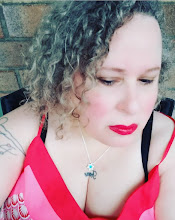I loved New York.
I loved it in the kind of way that one loves a best friend who's always been there, and who conceivably always will be. I loved the familiarity of everything, how this city that to those who don't live there must feel a bit like a beautiful but unpredictable beast, but to me, each block driving up Third Avenue felt as familiar as my own living room.
I loved New York, but I needed to unstick myself from the trajectory I was on.
I felt as if I was on that carnival ride, I think it's called the "Log Flume", where, you sit in a hollowed-out log, and instead of wheels on a track, you float through a trough that's filled with water, and it splashes you as you go.
My life up until I left, had begun to feel every bit like this ride, except that at the end, rather than the de-boarding platform where other, hot, impatient carnival goers were lined up waiting to ride, there was a sawmill, and I was moving closer and closer to that spinning blade everyday.
I love New York, and in my mind, I can see so many intimate details from my life, from each trodden-on gum stain and sidewalk crack through which I'd pass on my way to the Whole Foods on the corner at E 88th & 3rd, (that had taken over the commercial space that had been vacated by:
1. a small health food store,
2. a dialysis clinic, and
3. an after school tutoring business,)
or the Café d'Alsace on Second that had moved from the beautiful beaux artes building where I'd sit and watch the foot traffic while I drank my bowls of café au lait, (that has tragically, since been demolished,) to the spot, two storefronts up, where Elaine's used to be. I know which bushes in the church yard on E 88th between Second & First bear the most gorgeous flowers, and by instinct, on what day after Winter (or in a few cases, in the midst thereof,) that they'd come to life.
I know intimately, the aisles of the Fairway to which I'd go, all the way downtown, just for their Israeli food and gluten-free sections. I know the rows and corners of its produce section and exactly the spot to find fresh, fragrant, feathery bunches of dill, all slightly damp, and wrapped at their stems in a taupe rubber band.
I love New York, but when I see the same things every day, year after year year after year, I begin to think the same kinds of thoughts every day, year after year, and I look for ways to burst free of that cycle; sometimes, the only one that felt accessible to me was death.
I love New York, but I wasn't ready to die, so I left, to see new things, trip on different sidewalk cracks, learn new supermarkets and love different flowers, and to think different thoughts. To write different poems and stories and confessional essays.
Once, many, many years ago, while standing on 14th St, at Union Square South, I wrote a poem about the Zen maxim that says, "a man cannot step into the same river twice, for rivers flow, and so it's never truly the same river, and men change, think new thoughts, have new impressions; cells die and new cells are born, so even from moment to moment, a man is not the same man."
The poem was far shorter, and more importantly, distilled than this description of it, or the explanation I just gave, but then, it was a poem, and I mention it because, I love New York, and I miss her in ways that I'll never get over, regardless of what I tell you as I shrug my shoulders, cock my head and raise my eyebrows in that stoic gesture that says, "whadayagonnado?"
I love New York, but I'd begun to write the same poems over and over again, and to try to wet my feet in the same water from which they'd originally sprung.
I love New York, but I had gotten from her, all that I knew how.
I love New York, but it was time to leave.
It was time to leave, and so, I left, but also, I'm no longer young, and so, I returned to a river I'd also greatly loved, and as it turns out, the maxim holds true: it's not the same river, and I am most certainly not the same woman.



